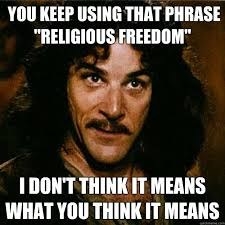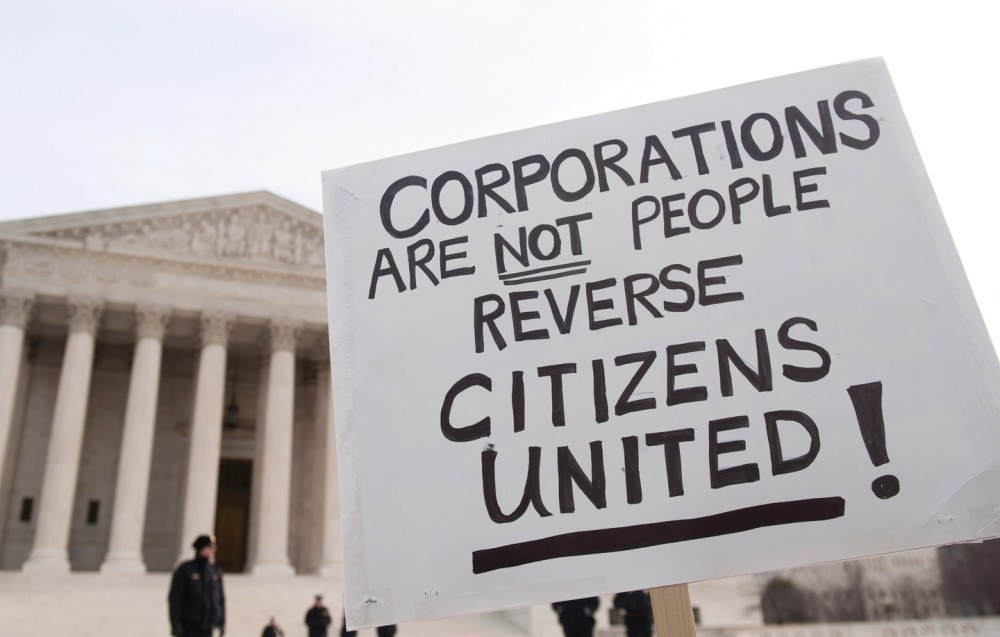What is Religious Freedom?
First Amendment states that there will be no law to support a specific religion (disestablishment) and it allows freedom of speech.
Wait a second... religious freedom isn't actually a thing?
No, not for everyone... the law favors Protestantism A LOT. Winifred Sullivan, in "Impossibility of Religious Freedom," stated, "The notion that religion exists and can be regulated without being defined is a fiction at the heart of religious freedom protection." What does this mean? Basically, by defining religion, we exclude certain religions. We can't define religion. It is impossible. We must accept that religion is practiced differently by different people and stop pretending that disestablishment is working.
Do you have another definition of religious freedom?

Of course. Elizabeth Hurd, author of "Politics of Religious Freedom" says, " The identification of religion and faith communities with a right to freedom of belief leaves little room for alternatives where religion is lived as ethics, culture but without necessarily belief, and therefore not freedom." So basically Protestants think that the definition of religion is the ability to believe in God.
How can we determine if an act is accepted because of religious freedom?
Sherbert Test 1963: It was used to broaden the protection that the Free Exercise Clause provided under the First Amendment. Four steps: Court must determine: 1. Does the individual have a sincere religious belief. 2. Is the law a substantial burden on the individual's religious belief? If so, in order to keep the law the Government must show that: 3. There is a compelling government interest to keep the law. 4. The law is using the least restrictive means. This precedent applies to later court cases such as Hobby Lobby.
Give me some historical context
We started off pretty well!
In George Washington's "Letter to the Jews of Newport (1790)" , Washington promised religious freedom for everyone! He even used Hebrew Scriptures to connect to the Jewish people to make them feel welcomed. "Every one shall sit in safety under his own vine and fig tree and there shall be none to make him afraid." This uniquely American idea that religious freedom was accessible to all was a defining quality of the United States that was worth imitating.
So maybe religious freedom is a little harder to actually implement than we thought.
Reynolds vs. US (1878) The Secretary of Mormon Church wanted to practice polygamy. He claimed he had the religious freedom to do so. The court stated that people could not practice their religion if it was criminal. They could only believe their religion. Historical Relevance: This was the first supreme court challenge of religious freedom and it strongly favored Protestantism. This started the recognition that defining religious freedom was harder to identify than to actually express. Therefore the court defaulted in a way that favored a Protestant view of religion.
Yeah now we kind of suck...

Employment Vs. Smith 1990 Although very important, we won't be addressing the protests in Standing Rock. However, we will be looking at other forms of inequality Native Americans have faced. Two Native American counselors injected peyote for religious sacrament and when tested for drugs, they were fired. The state of Oregon would not pay unemployment compensation because of "misconduct." The issue: About 100 years after Reynolds vs. US, the idea of practicing religion is stripped away and we are back to the original idea of just believing religion. The Sherbert test was not followed. Obviously this negatively effects Native Americans practicing their religion and sets the stage for the unequal treatment of individuals who don't identify with Protestantism.
Sounds like Employment vs. Smith doesn't pass Sherbert Test right?
Okay, so whats the significance of all of this?
Something that makes you go... huh?

Hobby Lobby Vs. Burwell Hobby Lobby didn't want to have to pay for contraceptive protection such as Plan B because it goes against the owner's pro-life religious beliefs. The court ruled that because it was a closely held corporation with sincere religious beliefs, they didn't have to pay for the Plan B pill. What are the implications? This court case redefined religious freedom to say that the law protects the owner's religious beliefs but not those of the employees. Unlike Employment Vs. Smith, this case stated that practice of your religion was supported by law. This favors Protestantism and negatively impacts people who do not hold the same religious beliefs.
Islamophobia
More Obama on Islamophobia
View this video on YouTube
Unfortunately religious freedom is something we still struggle with now during the 21st century. In particular, this country is facing Islamophobia. In fact, in Sarah Mccammon's article "Conservative Christians Grapple with Religious Freedom and Muslims" she states that "communities are debating over the right to build mosques." Christians are struggling with the idea of religious freedom for Muslims in the US. The past court cases have formed a sense of Christian privilege in the US which can inhibit other religions from having the same freedom.
THANK YOU ARTICLE VI PARAGRAPH 3
So you know this whole "extreme vetting" thing President elect Donald Trump talks about? Yeah sorry Trump... that's unconstitutional. Article VI Paragraph 3 states that anyone running for any US office position may not be required to take a religious test. This is significant now because the idea of having Muslims being "labeled" as Muslim, contravenes the religious freedom laws in the US.
Has religious freedom gone too far now?




